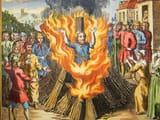>>941113262
Some citations, not because I think you can be reasoned with:
(1915) Alan H. Gardiner - Some Personifications: I. Hike, The God of Magic
Proceedings of the Society of Biblical Archaeology 37, Page 262
That Magic should have been regarded as the attribute of a deity, and a fortiori as itself a deity, destroys at one blow the theories of those who discern a fundamental distinction between what is religious and what is magical.
(1993) Martin Stol - Epilepsy in Babylonia
Page 3
Returning now to the "prehistory" of epilepsy, we will present the treatment of epilepsy as practised by the Babylonians and Assyrians, the subject-matter of this book. We base ourselves on the clay tablets used by them as writing material, inscribed with their cuneiform scripts. Their experts in medicine were primarily theologians and ritualists, something like "exorcists", because at that time medicine and magic were one and no distinction between religion and magic can be seen.
(1993) Robert Kriech Ritner - The Mechanics of Ancient Egyptian Magical Practice
Page 28
The undisputed prominence of Heka/heka within orthodox Egyptian theology necessarily provokes skepticism about the supposed incompatibility of "religion" and "magic."
(2018) Christian H. Bull - The Tradition of Hermes Trismegistus: The Egyptian Priestly Figure as a Teacher of Hellenized Wisdom
Page 57
Robert K. Ritner has expertly demonstrated that in Egyptian tradition, the distinction between magic and religion was non-existent: the ritual experts of the temples wielded magical power, heka, and used it in temple, royal, and private contexts.






